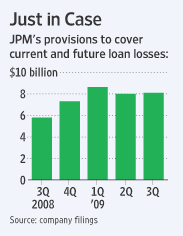JP Morgan Earned $11.7 Billion Last Year, Has Earmarked $26.9 Billion, Mostly For Bonuses
Posted By thestatedtruth.com on January 15, 2010
JP Morgan Chase Earns $11.7 Billion in Year
JPMorgan Chase kicked off what is expected to be a robust — and controversial — reporting season. In a remarkable rebound from the depths of the financial crisis, JPMorgan earned $11.7 billion last year, more than double its profit in 2008, and generated record revenue. The bank earned $3.3 billion in the fourth quarter alone.
Those cheery figures were accompanied by news that JPMorgan had earmarked $26.9 billion to compensate its workers, much of which will now be paid out as bonuses. That is up about 18 percent, with employees, on average, earning about $129,000. Workers in JPMorgan’s investment bank, on average, earned roughly $380,000 each. Top producers, however, expect to collect multimillion-dollar paychecks.
The strong results — coming a day after the Obama administration, to howls from Wall Street, announced plans to tax big banks to recoup some of the money the government expects to lose from bailing out the financial system — underscored the gaping divide between the financial industry and the many ordinary Americans who are still waiting for an economic recovery.In a statement on Friday, Jamie Dimon, the chairman and chief executive of JPMorgan, said that bank “fell short†of its earnings potential and remained cautious about 2010 considering the job and housing markets continue to be weak.
“We don’t have visibility much beyond the middle of this year and much will depend the on how the economy behaves,†Michael J. Cavanagh, the bank’s finance chief, said in a conference call with journalists. Across the industry, analysts expect investment banking revenue to moderate this year and tighter regulations to dampen profit. As consumer and businesses continue to hunker down, lending has also fallen. The bank set aside another $1.9 billion to its consumer loan loss reserves — a hefty sum but less than in the prior periods.
That could be a sign that bank executives are more comfortable that the economy may be turning a corner. The bank has now stockpiled more than $32.5 billion to cover future losses. Still, Mr. Dimon warned the economy was still too fragile to declare that the worst was over but hinted that things might stabilize toward the middle of the year. “We want to see a real recovery, just in case you have another dip down,†he said on a conference call with investors. Earlier, Mr. Cavanagh said that the bank hoped to restore the dividend to 75 cents or $1 later by the middle of 2010.
Over all, JPMorgan said 2009 net income rose to $11.7 billion, or $2.26 a share. That compares to profit of $5.6 billion, or $1.35 a share, during 2008 when panic gripped the industry. Revenue grew to a record $108.6 billion, up 49 percent.
JPMorgan has emerged from the financial crisis with renewed swagger. Unlike several other banking chiefs, Mr. Dimon has entered 2010 with his reputation relatively unscathed. Indeed, he is regarded both on Wall Street and in Washington as a pillar of the industry. On Wednesday on Capitol Hill, during a hearing of the government panel charged with examining the causes of the financial crisis, Mr. Dimon avoided the grilling given to Lloyd C. Blankfein, the head of Goldman Sachs. Mr. Dimon was also the only banker to publicly oppose the administration’s proposed tax on the largest financial companies.
Moreover, JPMorgan appears have taken advantage of the financial crisis to expand its consumer lending business and vault to the top of the investment banking charts, including a top-flight ranking as a fee-earner. Over all, the investment bank posted a $6.9 billion profit for 2009 after suffering a $1.2 billion loss in 2008 when the bank took huge charges on soured mortgage investments and buyout loans.
As the investment bank’s income surged, the amount of money set aside of compensation rose by almost one-third, to about $9.3 billion for 2009. But JPMorgan officials cut of the portion of revenue they put into the bonus pool by almost half from last year.
Bank officials have said that they needed to reward the firm’s standout performance with the need to show restraint to a public outraged over banker pay. Other Wall Street firms may make similarly large adjustments.
Chase’s consumer businesses, however, are still hemorrhaging money. Chase Card Services, its big credit card unit, lost $2.23 billion in 2009 and is unlikely to turn a profit this year. Chase retail services eked out a $93 million profit for 2009, though it posted $399 million annual loss in the fourth quarter. To try to stop the bleeding, the bank agreed to temporarily modify about 600,000 mortgages. Only about 89,000 of those adjustments have been made permanent.
Chase’s corporate bank, meanwhile, booked a $1.3 billion profit this year, even as it recorded losses on commercial real estate loans. Still, that represents a smaller portion of the bank’s overall balance sheet compared to many regional and community lenders. JPMorgan’s asset management business and treasury services units each booked similar profits for 2009.


Comments